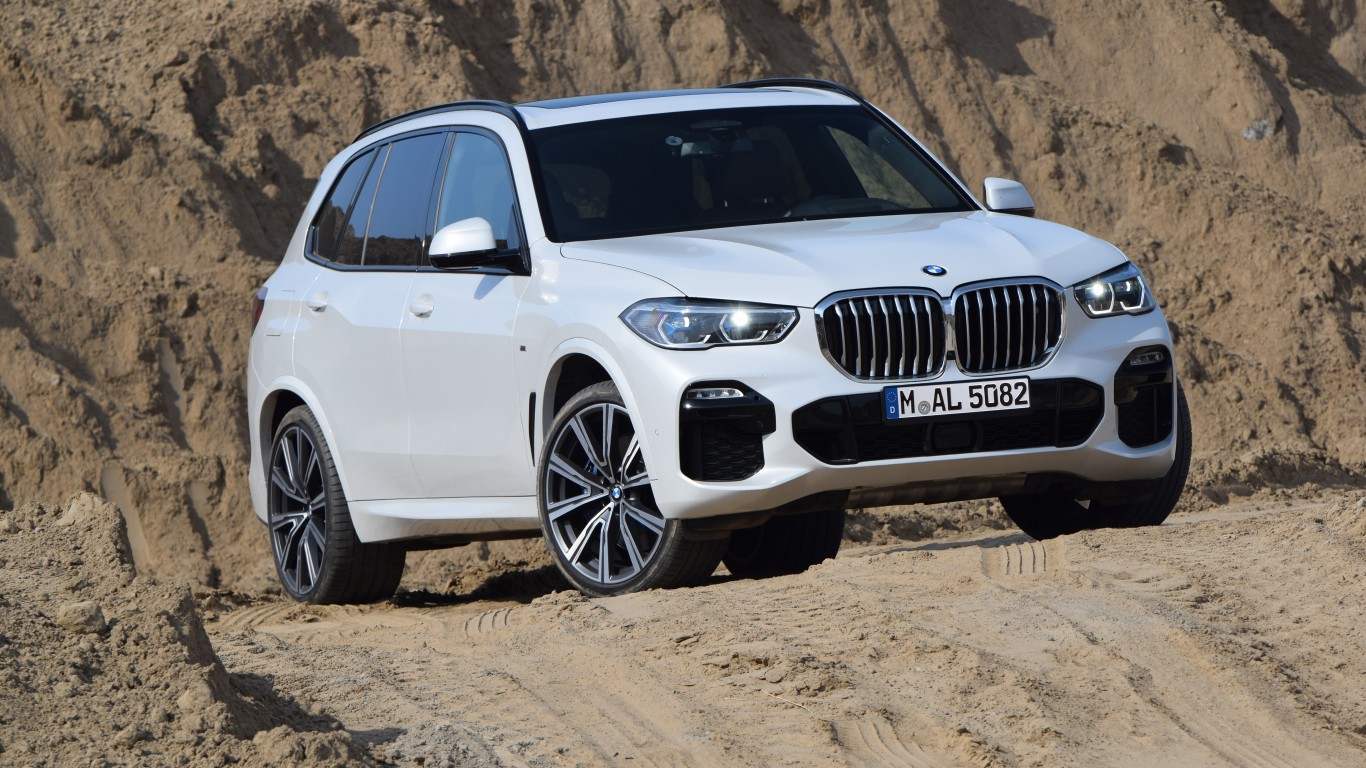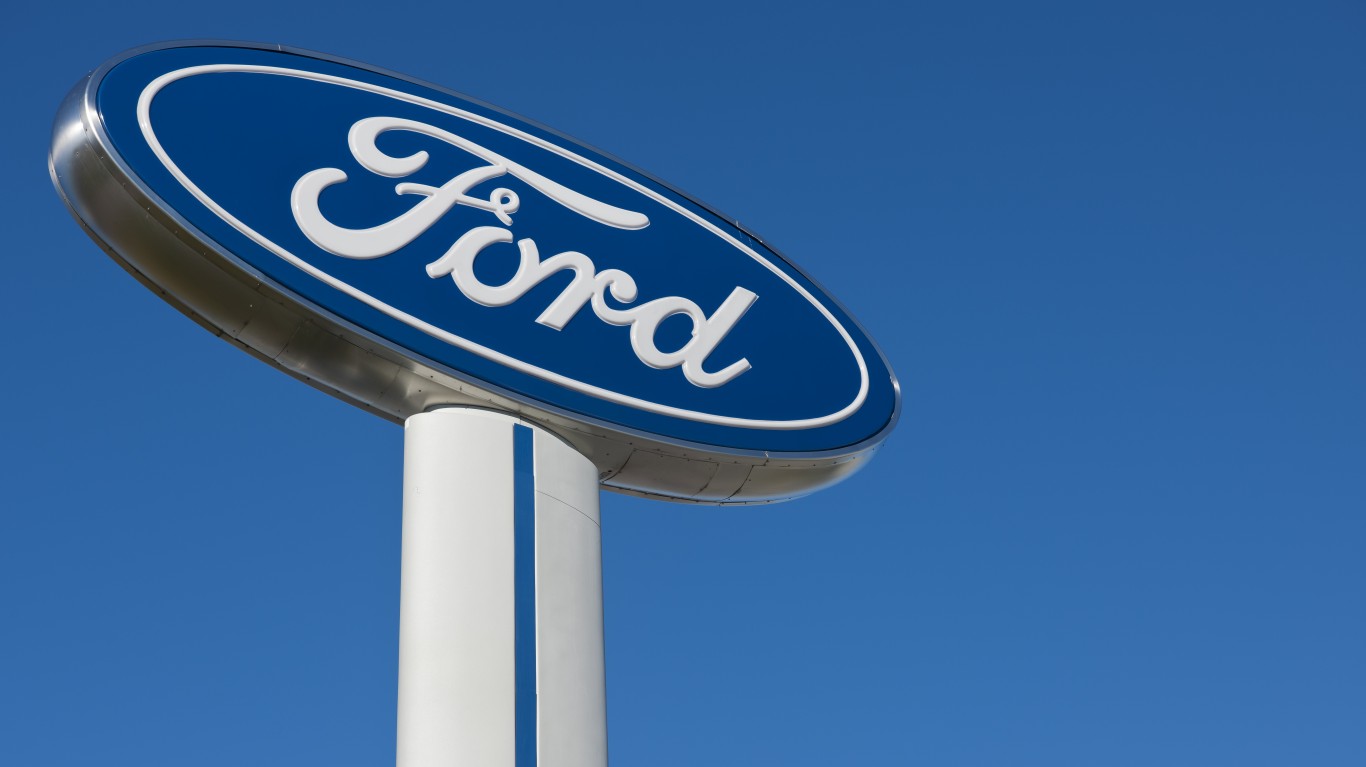 April car sales data are out, and they are not cause for celebration. Though sales are up 2% overall from last April, they have cooled somewhat since the February and March run. There are a few winners, however, including Toyota (NYSE: TM), Chrysler and several European auto makers, some of which are up over 20%. Meanwhile, General Motors (NYSE: GM) and Ford (NYSE: F) are down.
April car sales data are out, and they are not cause for celebration. Though sales are up 2% overall from last April, they have cooled somewhat since the February and March run. There are a few winners, however, including Toyota (NYSE: TM), Chrysler and several European auto makers, some of which are up over 20%. Meanwhile, General Motors (NYSE: GM) and Ford (NYSE: F) are down.
Read The Cars Americans Will Not Buy
While a few brands are doing incredibly well, dealers cannot even give away some models. “Days to turn,” or “days on the lot,” reflects the average number of days a vehicle is in dealer inventory before it is sold. All of the car models on our list spent more than 90 days on the lot, considerably longer than the 52-day average. Working with Edmunds.com, 24/7 Wall St. identified 10 cars that Americans are not buying.
Not surprisingly, time on the lot appears to be an excellent proxy for how vehicles are selling. The average car sold in America sold 35,593 units in 2011, according to Edmunds. Eight of the cars on this list sold less than that. Five sold less than 15,000 units last year.
In addition to having poor sales last year, overall sales of seven of the 10 dropped between 2009 and 2011. Total sales of five cars plummeted more than 30%. Two of the cars on this list, the DTS and the Honda Element, have been discontinued, and several more may be in jeopardy.
It is not always clear what makes a car unpopular. The cars on the list are all different types, from pickup trucks to compacts. They are also made by a number of different manufacturers, although six are made in Japan.
Fuel efficiency, on the other hand, appears to be a major factor for these cars’ poor sales. As the price of gas climbs to $4 per gallon, Americans appear to be making more fuel-efficient choices for their family vehicle. Six of the vehicles on the list have combined gas mileage — city and highway — of 25 MPG or less. According to the EPA, the Nissan Titan, which has among the longest days on lot, gets just 15 combined MPG.
Even when these cars belong to categories that generally get poor gas mileage, such as SUVs and pickups, they are still among the worst in their class. The Cadillac DTS, for example, gets a combined 18 MPG. By comparison, the Honda Accord, another full-size sedan, averages 27 combined MPG.
Based on car reviews, poor quality appears to be hurting sales of the cars on our list as well. JD Power reviewed eight of the 10 models on our list. Only one car scored better than a 3 out of 5 in both “overall quality and design” and “initial quality” — considered only passable scores. Three models on this list only scored a 2 out of 5 in initial quality.
24/7 Wall St. obtained days-to-turn data for the full year 2011 provided by auto industry analytics organization Edmunds. To avoid inconsistencies that can arise from small data sets, we only looked at vehicles that sold at least 10,000 units in 2011. We also looked at the list prices of these vehicles as provided by the dealer, fuel efficiency data from the U.S. EPA, and quality ratings provided by JD Power & Associates and Consumer Reports. Edmunds also provided sales figures going back to 2006. All unit sales listed are U.S. only.
These are the cars Americans will not buy.
10. Dodge Ram Pickup 1500
> Days to Turn: 91
> Price: $20,610
> Configuration: 6 Cyl, 2 Door
> MPG: 14 City, 20 Hwy
The Dodge Ram 1500 is the fourth-generation Dodge Ram, and has been in production since 2009. Combined with all other Dodge Ram models, domestic 2011 sales reached 156,900. While the trucks’s unit sales are far more than the rest of the vehicles on this list, they are far less than its own total sales from previous years. In 2006 the model sold 227,600 trucks. The 1500 has poor fuel efficiency, with 14 MPG in the city and 20 MPG on the highway. It also has particularly high owner costs, low predicted reliability, and high predicted depreciation. JD power rates the vehicle just 2 out of 5 for initial quality, but gives the car high marks for overall quality and design.
Also Read: The Most Powerful CEOs in America
9. Cadillac DTS
> Days to Turn: 93
> Price: $46,680
> Configuration: 8 Cyl, 4 Door
> MPG: 15 City, 23 Hwy
The Cadillac DTS was the automaker’s replacement for the Deville, which was phased out after 2005. Since it was introduced, sales of the vehicle have declined precipitously. In 2006, Cadillac sold nearly 60,000 units of the model. In 2010, it sold just 18,640 units. Last year, sales of the DTS were down to an all-time low of fewer than 12,000. A possible reason for these declining sales may have been the car’s terrible fuel economy. Cadillac discontinued the model, with 2011 being the last year of production, in order to make way for the coming XTS.
8. Suzuki SX4
> Days to Turn: 93
> Price: $16,999
> Configuration: 4 Cyl, 5 Door
> MPG: 23 City, 30 Hwy
Sales of the Suzuki SX4 increased roughly 8% between 2010 and 2011, from 11,600 units sold to 12,500. However, since the model was first introduced in 2007, sales have declined dramatically. From their peak in 2008 of just over 30,000 units, sales have fallen nearly 60% to 12,520 units last year. The SX4, for a compact crossover, has subpar gas mileage for a hatchback, and Consumer Reports gives the car mediocre ratings for ride, acceleration and depreciation, and a poor rating for overall satisfaction. JD power rates the vehicle just 2 out of 5 for initial quality. Average time on lot for the car, according to Edmunds, is 93 days.
Also Read: States Where the Most Children Lost Homes
7. Honda Element
> Days to Turn: 96
> Price: $19,168
> Configuration: 4 Cyl, 5 Door
> MPG: 20 City, 25 Hwy
Honda (NYSE: HMC) debuted its compact crossover SUV, the Element, in 2003. Sales of the car have tumbled since. In its first year, the car sold more than 84,000 units. By 2006, Honda moved just 51,800 units. And by last year, sales of the Element had declined to just over 11,500 units. In 2010, Honda announced it would discontinue the model, with the 2011 edition the last year of production. Last year, the car spent an average of 96 days on the dealer lot.
6. Toyota Matrix
> Days to Turn: 97
> Price: $18,845
> Configuration: 4 Cyl, 5 Door
> MPG: 26 City, 32 Hwy
The Matrix debuted in 2003 as a hatchback variation on the Corolla. The car, like its compact role model, gets decent gas mileage of 26 MPG in the city and 32 MPG on the highway. It also received very good reviews on Consumer Reports for reliability, owner costs and depreciation. Nevertheless, sales of the vehicle have been terrible. Toyota sold 49,400 units of the hatchback in 2008, 14,470 units in 2010, and less than 14,000 in 2011. The car averaged 97 days on the lot in 2011.
5. Toyota Yaris
> Days to Turn: 97
> Price: $14,115
> Configuration: 4 Cyl, 3 Door
> MPG: 30 City, 28 Hwy
Another small Toyota vehicle whose sales have struggled is the Yaris. This small, relatively fuel-efficient hatchback debuted in 1999 and became increasingly popular throughout the 2000s. In 2008, sales of the Yaris peaked at 102,328 units. In three short years, however, sales of the Yaris fell 68% to 32,700 vehicles sold in 2011. The car received a 41 out of 100 from Consumer Reports.
Also Read: American Companies With the Most Customers
4. Mazda 6
> Days to Turn: 100
> Price: $20,725
> Configuration: 6 Cyl, 4 Door
> MPG: 22 City, 31 Hwy
The first generation of the Mazda 6 was released in 2006 as Mazda’s answer for the midsize Camry and Accord. While not terrible, the car has slightly worse gas mileage than the other two vehicles. This may have contributed to its declining sales. Between 2006 and 2011, domestic sales declined 41%, from 61,200 to 35,700. According to Consumer Reports, the car scored average to poor in owner satisfaction, predicted depreciation and fuel economy. JD Power ranks the car 3 out of 5 in both overall quality and design and initial quality.
3. Kia Rio
> Days to Turn: 101
> Price: $13,400
> Configuration: 4 Cyl, 4 Door/4 Cyl, 5 Door
> MPG: 30 City, 40 Hwy
According to Edmunds, “As far as small economy cars go, there are better choices than the 2011 Kia Rio.” The average Kia Rio spent 101 days on the dealer lot in 2011, just shy of twice the length the average vehicle spent on the lot. Sales of the Rio, which comes in both subcompact and hatchback models, declined 18.3%, between 2010 and 2011, from 24,600 to 20,100.
Also Read: America’s Most (and Least) Peaceful States
2. Nissan Titan
> Days to Turn: 106
> Price: $28,520
> Configuration: 8 Cyl, 2 Door
> MPG: 13 City, 18 Hwy
The Nissan Titan was introduced in 2004 as the company’s full-size pickup. The Titan sold well in its early years. In 2007, Nissan sold 65,700 units of the truck in just one year. However, by 2008, sales had declined nearly 50% to 34,000. In 2011, the truck sold just fewer than 22,000 in total. Rising gas prices may be a factor in this. The truck’s current generation has an abysmal estimated mileage of 18 MPG on the highway and just 13 MPG in the city.
1. Volkswagen Routan
> 2011 Days to Turn: 107
> Price: $27,020
> Configuration: 6 Cyl, 4 Door
> MPG: 17 City, 25 Hwy
In 2005, Volkswagen entered into a partnership with Chrysler to develop its own minivan, using the American automaker’s Town & Country as the base model. The Routan, when it was introduced in 2008, became the first minivan made by the German company in North America. Sales, however, have been poor from the start. In 2009, the first full year of sales, just 14,600 units were sold. In 2010, sales were up slightly, to 15,900, but fell more than 20% to 12,470 in 2011. The car spent, according to Edmunds, an average of 107 days on the lot — more than double the U.S. average.
-Michael B. Sauter
Are You Ahead, or Behind on Retirement? (sponsor)
If you’re one of the over 4 Million Americans set to retire this year, you may want to pay attention.
Finding a financial advisor who puts your interest first can be the difference between a rich retirement and barely getting by, and today it’s easier than ever. SmartAsset’s free tool matches you with up to three fiduciary financial advisors that serve your area in minutes. Each advisor has been carefully vetted, and must act in your best interests. Start your search now.
Don’t waste another minute; get started right here and help your retirement dreams become a retirement reality.
Thank you for reading! Have some feedback for us?
Contact the 24/7 Wall St. editorial team.




